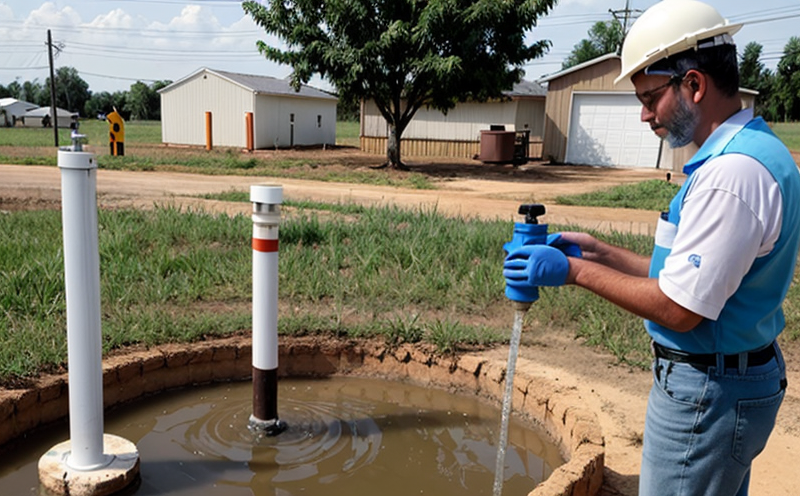ISO 5667-20 Groundwater Sampling Protocols Testing
The ISO 5667 series of standards provides guidelines for the sampling and preservation of water from natural or constructed water sources, including groundwater. This service focuses specifically on ISO 5667-20, which outlines procedures for collecting samples that are intended to be analyzed for compliance with regulatory requirements or to support scientific research.
The integrity and representativeness of a sample directly influence the accuracy of subsequent analysis, making proper sampling techniques critical. This service ensures that groundwater is collected in accordance with ISO 5667-20 guidelines, ensuring reliability and traceability throughout the analytical process. Our team employs state-of-the-art equipment and follows stringent protocols to minimize contamination and ensure accurate representation of the water body.
The testing covers a wide range of parameters including but not limited to pH, turbidity, conductivity, and various chemical constituents such as metals (e.g., arsenic, lead), organic compounds (e.g., benzene derivatives), and microbiological indicators. These tests are crucial for assessing compliance with local, national, and international regulations.
Proper sampling techniques involve the use of sterile containers, appropriate collection methods, and immediate preservation measures to prevent degradation or contamination of the sample. Our laboratory adheres strictly to these protocols, using calibrated equipment and trained personnel to ensure that each step is executed correctly. The collected samples are then transported under controlled conditions to our state-of-the-art facilities for analysis.
Our team also provides comprehensive reports detailing the sampling process, including site information, chain of custody documentation, and a summary of analytical results. These detailed records are vital for regulatory compliance and support decision-making processes in environmental management and resource allocation.
In addition to routine testing, we offer tailored services to meet specific client needs. This can include designing customized sampling plans, providing training on proper sampling techniques, or offering extended analysis for less commonly tested parameters such as radionuclides or emerging contaminants.
Applied Standards
| Standard | Description |
|---|---|
| ISO 5667-1:2019 | Sampling of water from natural sources – Part 1: Principles and terminology. |
| ISO 5667-20:2021 | Sampling of water from natural sources – Part 20: Groundwater sampling procedures. |
| ISO 8469:2008 | Water quality – Preservation and handling of water samples for analysis by analytical chemistry methods. |
The application of these standards ensures that the groundwater sampling process is both consistent with international best practices and tailored to meet specific client requirements. This comprehensive approach guarantees accurate, reliable, and legally defensible data.
Eurolab Advantages
- Expertise in ISO 5667 Compliance: Our team is trained specifically in the application of ISO 5667-20 guidelines to ensure accurate and reliable sampling.
- State-of-the-Art Facilities: Equipped with advanced instrumentation for precise measurement and analysis of groundwater parameters.
- Experienced Staff: Our personnel are highly skilled in both the technical aspects of sampling and the regulatory requirements associated with groundwater testing.
- Comprehensive Reporting: Detailed reports that include all relevant information from the sampling process, ensuring full traceability and compliance documentation.
We pride ourselves on providing a service that is not only technically robust but also tailored to meet the needs of our clients. Our commitment to quality and accuracy ensures that you receive reliable results every time.
International Acceptance and Recognition
- Widely Recognized Standards: ISO 5667-20 is internationally recognized, ensuring that the data generated from our services are accepted across borders and by various regulatory bodies.
- Cross-Border Compliance: Our sampling protocols meet or exceed international standards, making them suitable for use in any country with similar regulations.
The universal acceptance of these standards means that our results can be used confidently in a variety of contexts, from local compliance to global research projects. This ensures that your data is not only accurate but also widely applicable and accepted.





